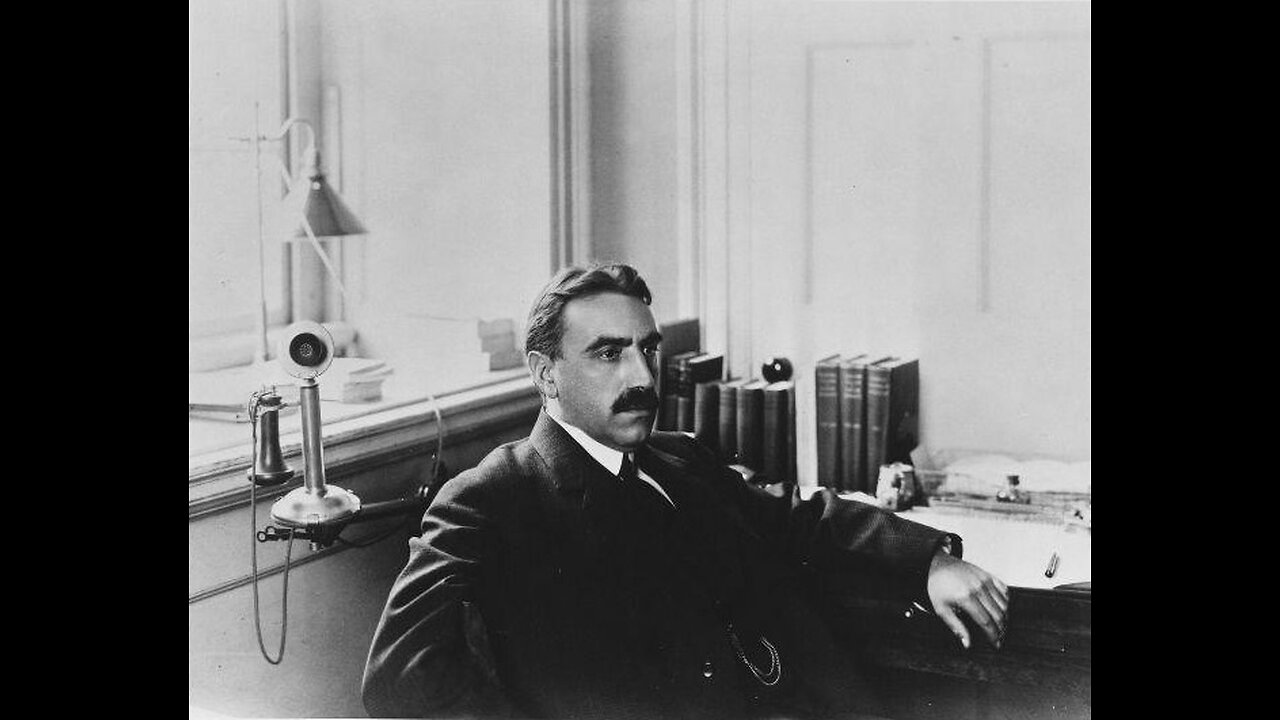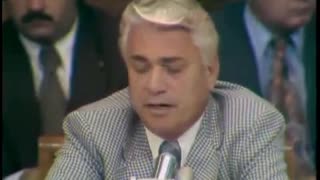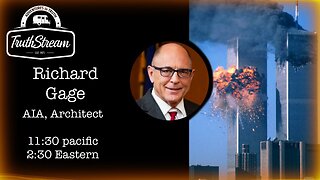Premium Only Content

Secrets of the Elites Who Rule Over Us (1985)
The dark side of history: https://thememoryhole.substack.com/
Bilderberg Group: Founded in 1954, the Bilderberg Group is an annual conference attended by influential figures from North America and Europe, including politicians, bankers, business leaders, and academics. Discussions at Bilderberg meetings are off the record, leading to speculation about their influence on global affairs.
Trilateral Commission: Established in 1973 by David Rockefeller, the Trilateral Commission aims to foster cooperation between North America, Europe, and East Asia. Its members are influential figures from politics, business, and academia. Critics argue that it promotes a globalist agenda and concentrates power among elites.
Council on Foreign Relations (CFR): Founded in 1921, the CFR is a U.S.-based think tank specializing in foreign policy and international affairs. Its members include politicians, diplomats, journalists, and scholars. The CFR publishes Foreign Affairs, a leading journal on international relations, and its influence extends to shaping U.S. foreign policy.
Economic Concentration: The concentration of economic power refers to the dominance of a few corporations or individuals in key industries. This concentration can lead to monopolistic practices, stifling competition, and influencing government policies in favor of the elite.
Interlocking Directorates: Interlocking directorates occur when individuals serve on the boards of multiple companies, creating connections and shared interests between corporations. This practice can reinforce the influence of a small group of individuals over multiple sectors of the economy.
Rockefeller Empire: The Rockefeller family, particularly through figures like John D. Rockefeller, amassed considerable wealth and influence in the late 19th and early 20th centuries. The Rockefeller Foundation and other philanthropic endeavors further extended their reach into various sectors, including education, healthcare, and research.
Wealth and Income Distribution: Studies consistently show that wealth and income in the U.S. are highly concentrated among the top earners and wealthiest individuals. The top 1% of the population often controls a disproportionate share of the nation's wealth, leading to concerns about economic inequality and its impact on society.
The Bilderberg Meeting (also known as the "Bilderberg Group", "Bilderberg Conference" or "Bilderberg Club") is an annual off-the-record forum established in 1954 to foster dialogue between Europe and North America. The group's agenda, originally to prevent another world war, is now defined as bolstering a consensus around free market Western capitalism and its interests around the globe. Participants include political leaders, experts, captains of industry, finance, academia, numbering between 120 and 150. Attendees are entitled to use information gained at meetings, but not attribute it to a named speaker (known as the Chatham House Rule). The group states that the purpose of this is to encourage candid debate while at the same time maintaining privacy, but critics from a wide range of viewpoints have called it into question, and it has provoked conspiracy theories from both the left and right.
Meetings were chaired by Prince Bernhard of the Netherlands until 1975. The current Chairman is French businessman Henri de Castries. Since 1954, the meeting has taken place every year except in 1976, when it was cancelled due to the Lockheed bribery scandals involving Prince Bernhard,[1] and in 2020 and 2021 due to the COVID-19 pandemic.[2] Lisbon hosted the 69th meeting in 2023.[3]
Origin
Main article: 1954 Bilderberg Conference
The first conference was held at the Bilderberg Hotel (Hotel de Bilderberg) in Oosterbeek, Netherlands, from 29 to 31 May 1954.[4][5] The hotel gave its name both to the group and to the "Bilderbergers" who participate in its activities. The hotel is situated in a quiet location, approximately 7 km west of the city of Arnhem.[6] It is owned and operated by the Bilderberg hotel chain, which runs 12 hotels and an event location in the Netherlands and one hotel in Germany.[7] At the time of the 1954 conference, it was a medium-sized family-run hotel.[6]
The conference was initiated by several people, including Polish politician-in-exile Józef Retinger who, concerned about the growth of anti-Americanism in Western Europe, proposed an international conference at which leaders from European countries and the United States would be brought together with the aim of promoting Atlanticism—better understanding between the cultures of the United States and Western Europe to foster cooperation on political, economic, and defense issues.[8][9]
Retinger approached Prince Bernhard of the Netherlands[10] who agreed to promote the idea, together with former Belgian prime minister Paul van Zeeland, and the then head of Unilever, Paul Rijkens. Bernhard in turn contacted Walter Bedell Smith, the then head of the CIA, who asked Eisenhower adviser Charles Douglas Jackson to deal with the suggestion.[11] The guest list was to be drawn up by inviting two attendees from each nation, one of each to represent "conservative" and "liberal" points of view.[9] Fifty delegates from 11 countries in Western Europe attended the first conference, along with 11 Americans.[12]
The success of the meeting led the organizers to arrange an annual conference. A permanent steering committee was established with Retinger appointed as permanent secretary. As well as organizing the conference, the steering committee also maintained a register of attendee names and contact details with the aim of creating an informal network of individuals who could call upon one another in a private capacity.[13] Conferences were held in France, Germany, and Denmark over the following three years. In 1957, the first U.S. conference was held on St. Simons Island, Georgia, with $30,000 from the Ford Foundation. The foundation also supplied funding for the 1959 and 1963 conferences.[11]
Participants
Main article: List of Bilderberg participants
The participants are between 120 and 150 people, including political leaders, experts from industry, finance, academia and the media.[8] About two thirds of the participants come from Europe and the rest from North America; one third from politics and government and the rest from other fields.[8][5] Historically, attendee lists have been weighted toward bankers, politicians, directors of large businesses[14] and board members from large publicly traded corporations, including Wallenberg-owned conglomerate holding company Investor AB and other Wallenberg-owned multinationals such as Ericsson and ABB, IBM, Xerox, Royal Dutch Shell, Nokia and Daimler.[15] Heads of state, including former King Juan Carlos I of Spain and former Queen Beatrix of the Netherlands, have attended meetings.[15][16] A source connected to the group told The Daily Telegraph in 2013 that other individuals, whose names are not publicly issued, sometimes turn up "just for the day" at the group's meetings.[17]
The banker and industrialist Marcus Wallenberg Jr. was a member of the steering committee and attended the meeting twenty-two times from the 1950s to 1981, a year prior to his death. His grandson Marcus Wallenberg has attended it eight times and his other grandson, Jacob Wallenberg, seventeen times.[18]
Meetings
Further information: List of Bilderberg meetings
Activities and goals
The group's original goal of promoting Atlanticism, of strengthening U.S.-European relations and preventing another world war has grown; according to Andrew Kakabadse, the Bilderberg Group's theme is to "bolster a consensus around free-market Western capitalism and its interests around the globe".[5] In 2001, Denis Healey, a Bilderberg group founder and a steering committee member for 30 years, said, "To say we were striving for a one-world government is exaggerated, but not wholly unfair. Those of us in Bilderberg felt we couldn't go on forever fighting one another for nothing and killing people and rendering millions homeless. So we felt that a single community throughout the world would be a good thing."[19]
According to the web page of the group, the meetings are conducted under the Chatham House Rule, allowing the participants to use any information they gained during the meeting, but not to disclose the names of the speakers or any other participants. According to former chairman Étienne Davignon in 2011, a major attraction of Bilderberg group meetings is that they provide an opportunity for participants to speak and debate candidly and to find out what major figures really think, without the risk of off-the-cuff comments becoming fodder for controversy in the media.[20] A 2008 press release from the "American Friends of Bilderberg" stated that "Bilderberg's only activity is its annual Conference and that at the meetings, no resolutions were proposed, no votes taken, and no policy statements issued."[21] However, in November 2009, the group hosted a dinner meeting at the Château of Val-Duchesse in Brussels outside its annual conference to promote the candidacy of Herman Van Rompuy for President of the European Council.[22]
Organizational structure
Meetings are organized by a steering committee with two members from each of approximately 18 nations.[23] Official posts include a chairman and an Honorary Secretary General.[15] The group's rules do not contain a membership category but former participants receive the annual conference reports.[24] The only category that exists is "member of the steering committee".[25] Besides the committee, there is a separate advisory group with overlapping membership.[26]
Dutch economist Ernst van der Beugel became permanent secretary in 1960, upon Retinger's death. Prince Bernhard continued to serve as the meeting's chairman until 1976, the year of his involvement in the Lockheed affair. The position of Honorary American Secretary General has been held successively by Joseph E. Johnson of the Carnegie Endowment; William Bundy of Princeton University; Theodore L. Eliot Jr., former U.S. ambassador to Afghanistan; and Casimir A. Yost of Georgetown University's Institute for the Study of Diplomacy.[27]
According to James A. Bill, the "steering committee usually met twice a year to plan programs and to discuss the participant list".[28]
In 2002, in Them: Adventures with Extremists, author Jon Ronson wrote that the group has a small central office in Holland [sic] which each year decides what country will host the forthcoming meeting. The host country then has to book an entire hotel for four days, plus arrange catering, transport and security. To fund this, the host solicits donations from sympathetic corporations such as Barclays, Fiat Automobiles, GlaxoSmithKline, Heinz, Nokia and Xerox.[29]
Chairmen of the Steering Committee
Chairmen of the Steering
Committee of the Bilderberg Meetings Tenure as Chairman Country Office(s)
Prince Bernhard of Lippe-Biesterfeld Prince Bernhard of Lippe-Biesterfeld
(1911–2004) 29 May 1954 – 29 September 1976
(22 years, 123 days)
[30] Netherlands Prince consort of the Netherlands
(1948–1980)
Inspector general of the Armed forces of the Netherlands
(1970–1976)
Inspector general of the Royal Netherlands Air Force
(1953–1970)
Inspector general of the Royal Netherlands Navy
(1946–1970)
Inspector general of the Royal Netherlands Army
(1945–1970)
Commander-in-chief of the Armed forces of the Netherlands
(1944–1945)
Alec Douglas-Home, Baron Home of the Hirsel Alec Douglas-Home,
Baron Home of the Hirsel
(1903–1995) 22 April 1977 – 20 April 1980
(2 years, 364 days)
[30] United Kingdom Prime Minister of the United Kingdom
(1963–1964)
Leader of the Conservative Party
(1963–1965)
Secretary of State for Foreign and Commonwealth Affairs
(1960–1963, 1970–1974)
Lord President of the Council
(1957, 1959–1960)
Leader of the House of Lords
(1957–1960)
Secretary of State for Commonwealth Relations
(1955–1960)
Member of the House of Lords
(1951–1963, 1974–1995)
Member of Parliament
(1931–1945, 1950–1951, 1963–1974)
Walter Scheel Walter Scheel
(1919–2016) 15 May 1981 – 12 May 1985
(3 years, 362 days)
[31][32] Germany President of Germany
(1974–1979)
(Acting) Chancellor of Germany
(1974)
Vice-Chancellor
(1969–1974)
Minister of Foreign Affairs
(1969–1974)
Leader of the Free Democratic Party
(1968–1974)
Minister of Economic Cooperation
(1961–1969)
Member of the European Parliament
(1956–1961)
Member of the Bundestag
(1953–1974)
Eric Roll, Baron Roll of Ipsden
(1907–2005) 25 April 1986 – 14 May 1989
(3 years, 19 days)
[33] United Kingdom Member of the House of Lords
(1977–2005)
Peter Carington, 6th Baron Carrington Peter Carington, 6th Baron Carrington
(1919–2018) 11 May 1990 – 17 May 1998
(8 years, 6 days)
[12][34] United Kingdom Secretary General of NATO
(1984–1988)
Secretary of State for Foreign and Commonwealth Affairs
(1979–1982)
Secretary of State for Energy
(1974)
Chairman of the Conservative Party
(1972–1974)
Secretary of State for Defence
(1970–1974)
Leader of the House of Lords
(1963–1964)
Minister without portfolio
(1963–1964)
First Lord of the Admiralty
(1959–1963)
High Commissioner to Australia
(1956–1959)
Member of the House of Lords
(1941–2018)
Étienne Davignon, Viscount Davignon Étienne Davignon, Viscount Davignon
(born 1932) 3 June 1999 – 12 June 2011
(12 years, 9 days)
[23][35][36] Belgium European Commissioner for Industrial Affairs and Energy
(1981–1985)
European Commissioner for Internal Market,
Customs Union and Industrial Affairs
(1977–1981)
Henri de Castries, 5th Count of Castries Henri de Castries, 5th Count of Castries
(born 1954) 31 May 2012 – 2019
(7 years)
[37] France Chairman and CEO of AXA (2000–2016)
Criticism
There have been long standing concerns about lobbying,[38][39] since senior policymakers meet with corporate lobbyists, and in the case of the 2015 meeting even with senior figures at Transparency International.[40]
Partly because of its working methods to ensure strict privacy and secrecy,[41] the Bilderberg Group has been criticised for its lack of transparency and accountability.[42] Ian Richardson sees Bilderberg as the transnational power elite, "an integral, and to some extent critical, part of the existing system of global governance", that is "not acting in the interests of the whole". Many of these critics have emphasized that they do not accept or do not believe that there is enough evidence to support the diversity of conspiracy theories that have arisen in regard to the group and that they disapprove of what they regard as their unpleasant associations and connotations.[43] For example, an article by the English commentator Charlie Skelton in The Guardian in June 2017 criticized the world view expressed in an agenda published by the Bilderberg group without engaging in speculation about conspiratorial activities.[44]
Conspiracy theories
The secrecy of the proceedings has led not only to varied criticism of the group and its activities from across the political spectrum but also to a number of conspiracy theories,[45][20][46] which have grown especially popular within certain political movements, although the different factions of theorists often disagree about the exact nature of the group's intentions and use different sources and levels of evidentiary rigor to back up their conjectures. Some on the left, or of less specific political affiliations, accuse the Bilderberg group either of covertly imposing or generally propping up capitalist domination and corporate power,[47] while some on the right have accused the group of imposing or helping to prepare the way for a world government and a global planned economy. The right-wing theorists tend to treat the group as the central directorate or planning arm of the conspiracy or at least attribute considerable importance to its role, whereas most of the left-wing and more loosely-affiliated or apolitical theorists treat it as just one of a set of institutions that help to advance international corporate interests and ideology.[48]
In 2005, Davignon discussed accusations of the group striving for a one-world government with the BBC: "It is unavoidable and it doesn't matter. There will always be people who believe in conspiracies but things happen in a much more incoherent fashion. ... When people say this is a secret government of the world I say that if we were a secret government of the world we should be bloody ashamed of ourselves."[46]
In a 1994 report, Right Woos Left, published by the Political Research Associates, investigative journalist Chip Berlet argued that right-wing populist conspiracy theories about the Bilderberg group date back to as early as 1964 and can be found in Phyllis Schlafly's self-published book A Choice, Not an Echo,[49] which promoted a conspiracy theory in which the Republican Party was secretly controlled by elitist intellectuals dominated by members of the Bilderberg group, whose internationalist policies would pave the way for world communism.[50]
In August 2010, former Cuban president Fidel Castro wrote an article for the Cuban Communist Party newspaper Granma in which he cited Daniel Estulin's 2006 book The Secrets of the Bilderberg Club,[51] which, as quoted by Castro, describes "sinister cliques and the Bilderberg lobbyists" manipulating the public "to install a world government that knows no borders and is not accountable to anyone but its own self."[47]
Proponents of Bilderberg conspiracy theories in the United States include such groups and individuals such as the John Birch Society,[48][52] political activist Phyllis Schlafly,[52] writer Jim Tucker,[53] political activist Lyndon LaRouche,[54] conspiracy theorist Alex Jones,[5][55][56] and politician Jesse Ventura, who made the Bilderberg group a topic of a 2009 episode of his TruTV series Conspiracy Theory with Jesse Ventura.[57] Although conspiracy theories about the Bilderberg Group have gained the most widespread credence by far in the United States, some high-profile non-American proponents have raised them as well, including Lithuanian writer Daniel Estulin[58] and British politician Nigel Farage.[59]
See also
Bohemian Club
Chatham House (The Royal Institute of International Affairs)
Council on Foreign Relations
Le Cercle
Transnational capitalist class
Trilateral Commission
Valdai Discussion Club
World Economic Forum
References
"U.S. to Urge Pact in U.N. to Combat Business Bribes". The New York Times. 6 March 1976. ISSN 0362-4331. Retrieved 8 June 2022.
Skelton, Charlie (4 June 2022). "Bilderberg reconvenes in person after two-year pandemic gap". the Guardian. Retrieved 26 April 2023.
"Press release 2023".
Atlas Obscura, "Hotel de Bilderberg"
"Bilderberg mystery: Why do people believe in cabals?". BBC News. 7 June 2011. Archived from the original on 10 June 2011. Retrieved 14 June 2011.
Gijswijt, Thomas, W., Informal Alliance: The Bilderberg Group and Transatlantic Relations during the Cold War, 1952–1968 (2018), Routledge. "The Hotel de Bilderberg was a medium-sized family-run hotel, chosen mainly for its quiet and remote location in the forests of the eastern Netherlands. It was not a particularly fancy hotel...but security was relatively easy to maintain since there was only one access road."
Bilderberg hotels
"About Bilderberg Meetings". Bilderberg Meetings the Official Website. Archived from the original on 17 April 2020. Retrieved 12 July 2018.
Hatch, Alden (1962). "The Hôtel de Bilderberg". HRH Prince Bernhard of the Netherlands: An authorized biography. London: Harrap. OCLC 2359663. "The idea was to get two people from each country who would give the conservative and liberal slant"
"Japan–US Relations – Past, Present and Future". Daily Yomiuri. 8 December 1991. "Rockefeller: The idea (of creating the Trilateral Commission) was incorporated in a speech that I made in the spring of 1972 for the benefit of some industrial forums that the Chase held in different cities around Europe, … Then Zbig (Zbig Brzezinski) and I both attended a meeting of the Bilderberg Group … and was shot down in flames. There was very little enthusiasm for the idea. I think they felt that they had a very congenial group, and they didn't want to have it interfered with by another element that would—I don't know what they thought, but in any case, they were not in favor."
Aubourg, Valerie (June 2003). "Organizing Atlanticism: the Bilderberg Group and the Atlantic Institute 1952–63". Intelligence & National Security. 18 (2): 92–105. doi:10.1080/02684520412331306760. S2CID 153892953.
Rockefeller, David (2002). Memoirs. New York: Random House. p. 412. ISBN 978-0679405887.
Hatch, Alden (1962). "The Hôtel de Bilderberg". HRH Prince Bernhard of the Netherlands: An authorized biography. London: Harrap. OCLC 2359663. "anybody who has ever been to a Bilderberg Conference should be able to feel that he can, in a private capacity, call on any former member he has met"
Moorehead, Caroline (18 April 1977). "An exclusive club, perhaps without power, but certainly with influence: The Bilderberg group". The Times. London.
"Bilderberg Meeting of 1997 Assembles" (Press release). PR Newswire. 13 June 1997. Archived from the original on 30 April 2011.
Oliver, Mark (4 June 2004). "The Bilderberg group". The Guardian. London.
"Bilderberg Group? No conspiracy, just the most influential group in the world". The Daily Telegraph (London). 6 June 2013. Retrieved 6 June 2013.
Karl, Hellberg (11 August 2018). "Bilderberggruppen och Wallenberg bakom selekteringen av svenskt regeringsstyre sedan 1950-talet". Newsvoice.
Ronson, Jon (10 March 2001). "Who pulls the strings? (part 3)". The Guardian. London. Retrieved 14 May 2009.
"A special report on global leaders". The Economist. 22 January 2011. pp. 12–14.
"Bilderberg Announces 2008 Conference". businesswire.com. BusinessWire. 2008. Retrieved 7 June 2008.
Waterfield, Bruno (16 November 2009). "EU Presidency candidate Herman Van Rompuy calls for new taxes". The Daily Telegraph. London. Archived from the original on 12 January 2022. "during a secret dinner to promote his candidacy hosted by the elite Bilderberg Group"
"Inside the secretive Bilderberg Group". BBC News. 29 September 2005. Archived from the original on 29 December 2008. Retrieved 5 August 2008.
Introduction p. 3 in Bilderberg meetings, Schnews, 1999
"Parliamentary questions: Answer given by Mr Prodi on behalf of the Commission". European Parliament. 15 May 2003.
Entry for Conrad Black, The International Who's Who. Europa Publications. 2000. ISBN 9781857430509.
"Bilderberg: List of Invitees" (PDF). United States Department of Defense. 31 January 1996. Archived from the original (PDF) on 19 May 2006. Retrieved 6 June 2009.
Bill, James A. (August 1998). George Ball: Behind the Scenes in U.S. Foreign Policy. Yale University Press. p. 53. ISBN 978-0300076462.
Ronson, Jon (2015) [First published 2002]. Them: Adventures with Extremists. London: Picador Classic. pp. 271–72. ISBN 978-1447275466.
"Twenty-fifth Bilderberg meeting held in St joseph MO". Facts on File World News Digest. 14 May 1977.
"Bilderberg Meetings Conference Report 1981".
"Bilderberg Meetings Conference Report 1985".
Who's Who. 1999.
"Bilderberg Meetings Conference Report 1990".
"Booklet of the 1999 annual conference". Schnews. Archived from the original on 2 March 2000.
"Final List of Participants of the 2011 Bilderberg annual conference". Official website. Archived from the original on 28 August 2011.
"Final List of Participants of the 2012 Bilderberg annual conference". Bilderberg Meetings. Archived from the original on 26 July 2013.
"Bilderberg Conference Watford 'Too Secret'". Sky News. 6 June 2013. Retrieved 11 June 2013.
Jones, Nelson (10 June 2013). "My brush with Bilderberg". New Statesman. Archived from the original on 15 June 2013. Retrieved 11 June 2013.
Charlie Skelton (14 June 2015). "Bilderberg 2015: TTIP and a travesty of transparency". The Guardian. Retrieved 15 November 2022.
"Confirmed: Secretive Bilderberg Meeting to be held in Switzerland from May 30th". www.thelocal.ch. 28 May 2019. Retrieved 29 May 2019.
Meacher, Michael; Skelton, Charlie (11 June 2013). "Bilderberg 2013: The sun sets on Watford". The Guardian. London. Retrieved 11 June 2013.
Richardson, Ian (31 May 2012). "Chantilly Laced: Holding Bilderberg and the Transnational Policy Elite to Account". Huffington Post. Retrieved 21 September 2015.
Skelton, Charlie (2 June 2017). "Bilderberg: the world's most secretive conference is as out of touch as ever". The Guardian. Retrieved 18 April 2018.
Gowen, Annie (2 June 2012). "Is Bilderberg a conference on world affairs or a powerful global cabal? Depends on who you ask". The Washington Post.
Bill Hayton (29 September 2005). "Inside the secretive Bilderberg Group". BBC News. Archived from the original on 8 February 2011. Retrieved 19 March 2011.
Weissert, Will (10 August 2010). "Fidel Castro fascinated by Bilderberg Club conspiracy theory". The Christian Science Monitor. Boston. Retrieved 16 October 2010.
Wallechinsky, David; Wallace, Irving (1975). "The Bilderberg Group Part 2". The People's Almanac. Doubleday. cited paragraphs. ISBN 978-0385040600.
Phyllis Schlafly, A Choice Not an Echo: The Inside Story of How American Presidents Are Chosen (Pere Marquette Press, 1964) ISBN 0686114868
Chip Berlet (1994). "The New Right & the Secular Humanism Conspiracy Theory".
Daniel Estulin, Los secretos del club Bilderberg (Ediciones del Bronce, 2006).
Berlet, Chip (2000). "John Birch Society". Retrieved 6 October 2010.
Iain Hollingshead (4 June 2010). "The Bilderberg Group: fact and fantasy". The Daily Telegraph. London. Archived from the original on 12 January 2022. Retrieved 20 June 2011.
King, Dennis (1979). "NCLC'S Private Intelligence Agency". Our Town. New York. Retrieved 14 May 2009.
Dixon, Hayley (9 June 2013). "'Idiot' Bilderberg conspiracy theorist disrupts BBC politics show". The Daily Telegraph. London. Archived from the original on 16 June 2013.
Taylor, Adam (9 June 2013). "Conspiracy Theorist Alex Jones Goes Berserk During BBC Show". Business Insider. Retrieved 9 June 2013.
"List of Season 1 episodes for Conspiracy Theory with Jesse Ventura". truTV. 30 December 2009. Archived from the original on 8 October 2010. Retrieved 11 January 2011.
Bruce Ramsey (30 July 2009). "That Bilderberg Book". The Seattle Times. Retrieved 23 January 2011.
Walker, Peter (6 May 2019). "Nigel Farage under fire over 'antisemitic tropes' on far-right US talkshow". Guardian News & Media Limited. Retrieved 6 May 2019.
Further reading
Ronson, Jon (2001). Them: Adventures with Extremists. London: Picador. ISBN 978-0330375467.
Eringer, Robert (1980). The Global Manipulators. Bristol, England: Pentacle Books. OCLC 26551991.
Estulin, Daniel (2007). The True Story of the Bilderberg Group. Oregon: Trine Day. ISBN 978-0977795345.
Gijswijt, Thomas W. (2019). Informal Alliance: The Bilderberg Group And Transatlantic Relations During The Cold War, 1952–1968. London: Routledgey. ISBN 978-0815396741.
Hodapp, Christopher; Alice Von Kannon (2008). Conspiracy Theories & Secret Societies For Dummies. Hoboken, NJ: Wiley. ISBN 978-0470184080.
Richardson, Ian N.; Andrew P. Kakabadse; Nada K. Kakabadse (2011). Bilderberg People: Elite power and consensus in world affairs. Hoboken, NJ: Routledge. ISBN 978-0415576352.
Klimczuk, Stephen; Gerald Warner (2010). Secret Places, Hidden Sanctuaries: Uncovering Mysterious Sites, Symbols and Societies. Sterling. ISBN 978-1402762079.
Retinger, J.H (August 1956). The bilderberg group. – A short essay on the origins of the group
The Trilateral Commission is a nongovernmental international organization aimed at fostering closer cooperation between Japan, Western Europe and North America.[1] It was founded in July 1973 principally by American banker and philanthropist David Rockefeller, an internationalist[2] who sought to address the challenges posed by the growing economic and political interdependence between the U.S. and its allies in North America, Western Europe, and Japan.[3]
The Trilateral Commission is headed by an executive committee and three regional chairs representing Europe, North America, and the Asia-Pacific region, with headquarters in Paris, Washington, D.C., and Tokyo, respectively. Meetings are held annually at locations that rotate among the three regions; regional and national meetings are held throughout the year.[4] Most gatherings focus on discussing reports and debating strategy to meet the commission's aims.
The Trilateral Commission represents influential commercial and political interests. As of 2021, there were roughly 400 members, including leading figures in politics, business, media, and academia. Each country within the three regions is assigned a quota of members reflecting its relative political and economic strength.
History
Founding
The Trilateral Commission was formed in 1973 by private citizens of Japan, North American nations (the U.S. and Canada), and Western European nations[3] to foster substantive political and economic dialogue across the world. The idea of the commission was developed in the early 1970s, a time of considerable discord among the United States and its allies in Western Europe, Japan, and Canada.[5] To quote its founding declaration:
"Growing interdependence is a fact of life of the contemporary world. It transcends and influences national systems... While it is important to develop greater cooperation among all the countries of the world, Japan, Western Europe, and North America, in view of their great weight in the world economy and their massive relations with one another, bear a special responsibility for developing effective cooperation, both in their own interests and in those of the rest of the world."
"To be effective in meeting common problems, Japan, Western Europe, and North America will have to consult and cooperate more closely, on the basis of equality, to develop and carry out coordinated policies on matters affecting their common interests... refrain from unilateral actions incompatible with their interdependence and from actions detrimental to other regions... [and] take advantage of existing international and regional organizations and further enhance their role."
"The Commission hopes to play a creative role as a channel of free exchange of opinions with other countries and regions. Further progress of the developing countries and greater improvement of East-West relations will be a major concern."[6]
Zbigniew Brzezinski, a Rockefeller advisor who was a specialist on international affairs (and later President Jimmy Carter's National Security Advisor from 1977 to 1981), left Columbia University to organize the group, along with:[7]
Edwin Reischauer, professor at Harvard University and United States Ambassador to Japan, 1961–1966[citation needed]
George S. Franklin, executive director of the Council on Foreign Relations 1953–1971[8][9]
Gerard C. Smith, SALT I negotiator and its first North American chairman
Henry D. Owen, foreign policy studies director at the Brookings Institution[10]
Max Kohnstamm, European Policy Centre[citation needed]
Robert R. Bowie, the Foreign Policy Association and director of the Harvard Center for International Affairs[citation needed]
Marshall Hornblower, former partner at Wilmer, Cutler & Pickering[citation needed]
Tadashi Yamamoto, Japan Center for International Exchange[11]
William Scranton, former governor of Pennsylvania. [citation needed]
Other founding members included Alan Greenspan and Paul Volcker, both later heads of the Federal Reserve System. [citation needed]
The organization's records are stored at the Rockefeller Archive Center in North Tarrytown, NY.[12]
Meetings
The Trilateral Commission initiated its biannual meetings in October 1973 in Tokyo, Japan. In May 1976 the first plenary meeting of all of the commission's regional groups took place in Kyoto, Japan. Since the ninth meeting in 1978, plenary meetings have taken place annually. Besides annual plenary meetings, regional meetings have also taken place in each of the Asia Pacific Group, the European Group and the North American Group.[13] Since its founding, the discussion group has produced an official journal, Trialogue.
Membership
Further information: List of members of the Trilateral Commission
Membership is divided into numbers proportionate to each of the think tank's three regional areas. North America is represented by 120 members: 20 Canadian, 13 Mexican and 87 American. The European group has reached its limit of 170 members from almost every country on the continent; the ceilings for individual countries are 20 for Germany, 18 for France, Italy and the United Kingdom, 12 for Spain and 1–6 for the rest. At first Asia and Oceania were represented only by Japan, but in 2000 the Japanese group of 85 members became the Pacific Asia group, comprising 117 members: 75 Japanese, 11 South Koreans, seven Australian and New Zealand citizens, and 15 members from the ASEAN nations (Indonesia, Malaysia, Philippines, Singapore and Thailand). The Pacific Asia group also included 9 members from China, Hong Kong and Taiwan. The commission now claims "more than 100" Pacific Asian members.[6]
The Trilateral Commission's bylaws apparently deny membership to public officials. It draws its members from politics, business, and academia, and has three chairpersons, one from each region. The current chairs are former U.S. Assistant Secretary of Defense for International Security Affairs Joseph S. Nye, Jr., former head of the European Central Bank Jean-Claude Trichet, and Yasuchika Hasegawa, chair of Takeda Pharmaceutical Company.[14]
Leadership
As of September 2021[15]
Name Position
Jean-Claude Trichet European Chairman
Meghan O'Sullivan North American Chairman
Akihiko Tanaka Asia Pacific Chairman
Alexandra Papalexopoulou European Deputy Chairman
Herminio Blanco Mendoza North American Deputy Chairman
Barry Desker Asia Pacific Deputy Chairman
Carl Bildt European Deputy Chairman
Jeffrey Simpson North American Deputy Chairman
Jin Roy Ryu Asia Pacific Deputy Chairman
David Rockefeller (deceased) Founder
Peter Sutherland (deceased) Honorary European Chairman
Georges Berthoin European Honorary Chairman
Paul Volcker (deceased) North American Honorary Chairman
Yasuchika Hasegawa Asia Pacific Honorary Chairman
Paolo Magri European Director
Richard Fontaine North American Director
Hideko Katsumata Asia Pacific Director
Notable members
Alyssa Ayres, Dean of the Elliott School of International Affairs, George Washington University
Catherine Bertini, Professor, Maxwell School of Citizenship and Public Affairs
Antony Blinken, U.S. Secretary of State since 2021, son of Donald Mayer Blinken, stepson of Samuel Pisar[16][17]
Michael R. Bloomberg, founder/CEO of Bloomberg L.P., mayor of New York City 2002–2013, namesake of largest U.S. school of public health at Johns Hopkins[16][18][19][20][21][22]
Sophie Boissard, Chief Executive Officer, Korian Group
Robert R. Bowie, Director of Policy Planning 1953–1957, Foreign Policy Association, co-founder with Henry Kissinger of Harvard Center for International Affairs 1958, Counselor of the State Department 1966–1968, CFR, CIA Chief National Intelligence Officer 1977–1979[7][23]
Lael Brainard, Chairman of the U.S. National Economic Council; member of U.S. Federal Reserve's Board of Governors; former Under Secretary U.S. Treasury
Ian Bremmer, president of Eurasia Group and GZERO Media[16]
Nicola Brewer, British diplomat, British High Commissioner to South Africa, DCMG
Esther Brimmer, executive director/CEO of NAFSA: Association of International Educators, Atlantic Council board; former Assistant Secretary of State for International Organization Affairs[24]
Mark Brzezinski, president and CEO of Brzezinski Strategies LLC, son of Zbigniew Brzezinski, and U.S. Ambassador to Sweden 2011–2015[16]
Zbigniew Brzezinski, U.S. National Security Advisor in Carter administration[7][25]
Steve Bunnell, partner in O’Melveny & Myers LLP, former General Counsel at DHS
R. Nicholas Burns, U.S. Ambassador to China since 2021, professor and board member of the Belfer Center for Science and International Affairs at Harvard Kennedy School, director of the Aspen Strategy Group, senior counselor at The Cohen Group, board member of Entegris Inc., CFR member, the Rockefeller Brothers Fund, Fulbright scholar at Queen Mary University of London 2020, vice chair of the American Ditchley Foundation, senior advisor at Chatham House, Under Secretary of State for Political Affairs 2005–2008, Atlantic Council board[24][16][26]
George H. W. Bush, President of the United States 1989–1993, Vice President of the United States 1981-1989[27]
Ash Carter, director of the Belfer Center for Science and International Affairs at Harvard Kennedy School, U.S. Secretary of Defense 2015–2017, CFR board, Aspen Strategy Group, Atlantic Council honorary director[24][28][16][29]
Jimmy Carter, President of the United States 1977–1981[23][25]
Jean Charest, partner in McCarthy Tétrault LLP, former Premier of Québec, member of the Queen's Privy Council for Canada
Michael Chertoff, chairman/co-founder of The Chertoff Group, Secretary of Homeland Security 2005–2009, judge on the U.S. Court of Appeals for the 3rd Circuit 2001–2003, Assistant Attorney General for the DoJ Criminal Division 2003–2005, Atlantic Council board[24][16]
Raymond Chrétien, strategic adviser at Fasken, former chair of the Montréal Council on Foreign Relations, former Associate Under Secretary of State of External Affairs, former Canadian Ambassador to the Congo, Belgium, Mexico, the United States, and France, nephew of Jean Chrétien[16]
Heidi Crebo-Rediker, former Chief Economist, U.S. Department of State and Assistant Secretary of State; Senior Fellow, Council on Foreign Relations
Helima Croft, Managing Director, RBC Capital Markets
Lee Cullum, Journalist, PBS
Caroline Daniel, British journalist, Financial Times
John M. Deutch, Director of CIA 1995–1996, Aspen Strategy Group)[28]
Paula Dobriansky, Senior Fellow, Harvard Belfer Center; former U.S. Under Secretary of State for Global Affairs
Wendy Dobson, Professor Emerita, Roman School of Management, University of Toronto
Hedley Donovan, former editor-in-chief of Time[25]
Nina Easton, Co-CEO, SellerEaston, former Washington Editor of Fortune
Jeffrey Epstein, former hedge fund manager convicted of sex trafficking in 2008, described as "an enthusiastic member of the Trilateral Commission" in 2002[30][31][32][33]
Dawn Farrell, President and CEO, TransAlta Corporation
Diana Farrell, former CEO and President, JP Morgan Institute, former Head of McKinsey Global Institute, former Deputy Director, U.S. National Economic Council
Laurence "Larry" Fink, CFR board member, BlackRock CEO since 1988, WEF trustee[16][29][34][35]
George S. Franklin, executive director of the Council on Foreign Relations 1953–1971[7][25][8][9]
Richard Gardner, Columbia law professor, U.S. Ambassador to Spain 1993–1997, U.S. Ambassador to Italy 1977–1981[25]
David Gergen, Harvard Kennedy School professor, adviser to Nixon, Ford, Reagan, Clinton, commentator for CNN[16][36][37][38]
Jamie S. Gorelick, partner at WilmerHale, U.S. Deputy Attorney General 1994–1997, General Counsel of DoD 1993–1994, defended BP after 2010 oil spill, 9/11 Commission member, Amazon board member[39][16]
Donald E. Graham, Graham Holdings chair since 2013, Washington Post publisher 1979–2000, Pulitzer Prize board 1999–2008, Facebook board 2009–2015, Bilderberg meeting attendee in 2009 and 2010[16][40]
Kelly Grier, former U.S. Chair and Managing Partner, EY
Jane Harman, former Member, U.S. House of Representatives; President Emerita, Wilson Center
Linda Hasenfratz, CEO, Linamar Corporation
Anniken Hauglie, former Director General, Norwegian Oil and Gas Association, former Minister of Labour and Social Affairs, Norway
Kerry Healey, President of the Milken Center for Advancing the American Dream; former Lieutenant Governor of Massachusetts
Marillyn A. Hewson, Former Chairman, President and Chief Executive Officer, Lockheed Martin Corporation
Fiona Hill, The Globalist writer, former Senior Director for Europe and Russia of the NSC[41][16][42]
Carla Anderson Hills, CFR co-chair 2007–2017, U.S. HUD Secretary 1975–1977, U.S. Trade Representative 1989–1993[16]
Melody Hobson, Co-CEO and President, Ariel Investments
Gerda Holzinger-Bergstaller, Chief Executive Officer, Erste Bank, Austria
Karen Elliott House, Former Publisher, The Wall Street Journal; former Senior Vice President, Dow Jones & Company.
Christopher B. Howard, Robert Morris University president since 2016, CFR, Rhodes scholar, Harvard Board of Overseers, Aspen Strategy Group[28]
Vivian Hunt, British businesswoman and Managing Partner at McKinsey, London
Samuel P. Huntington, former director of Harvard’s Center for International Affairs, former White House Coordinator of Security Planning for the U.S. National Security Council[25]
David Ignatius, Washington Post journalist, Body of Lies author, Aspen Strategy Group[28][16]
Ken Juster, U.S. Ambassador to India
Juliette Kayyem, Lecturer in Public Policy, JFK School of Government, Harvard University; former Assistant Secretary, U.S. Department of Homeland Security
John Kingman, British businessman and chairman at Legal & General
Henry Kissinger KCMG, National Security Adviser 1969–1975, U.S. Secretary of State 1973–1977, first chair of the 9/11 Commission Nov.–Dec. 2002, author of NSS Memo 200, Bilderberg attendee, subject of The Trials of Henry Kissinger, mentor of Klaus Schwab, Atlantic Council board[24][16][43][44][45][46]
Max Kohnstamm, European Policy Centre[7]
Jovan Kovacic, East West Bridge founder and president[25]
Nicholas D. Kristof, New York Times columnist, Aspen Strategy Group member, Rhodes scholar[16][47][48][49][50]
Stephanie Kusie, Canadian Member of Parliament
Monique Leroux, Former Chair of the Board and CEO, Desjardins Group
Tove Lifvendahl, political editor-in-chief of Svenska Dagbladet[51]
Cecilia Malmstrom, former European Commissioner for Trade, European Commission
Heather McPherson, Canadian Member of Parliament
Judith A. "Jami" Miscik, CFR vice chair, CIA Deputy Director for Intelligence 2002–2005, Global Head of Sovereign Risk at Lehman Brothers 2005–2008, PIAB chair 2014–2017, president/vice-chair of Kissinger Associates since 2009[16][29]
Andrea Mitchell, Chief Foreign Affairs & Chief Washington Correspondent NBC News, Anchor Andrea Mitchell Reports, MSNBC; spouse of Alan Greenspan[16]
Susan Molinari, former Member, U.S. House of Representatives
Walter Mondale,[25] VPOTUS 1977–1981, candidate in 1984 presidential election
Mario Monti, prime minister of Italy 2011–2013[52]
Heather Munroe-Blum, Chair, Canada Pension Plan Investment Board
John Negroponte, U.S. Deputy Secretary of State 2007–2009, UN Ambassador 2001–2004, first Director of National Intelligence 2005–2007, subject of The Ambassador, brother of MIT Media Lab founder Nicholas Negroponte[16]
Michelle Nunn, President and CEO, CARE
Joseph Nye, former U.S. Assistant Secretary of Defense for International Security Affairs, Atlantic Council board[24][25][23]
Claudia Olsson, founder and chair, Stellar Capacity[53]
Meghan O'Sullivan, Trilateral Commission North American chair, CFR board, Aspen Strategy Group[28]
Henry D. Owen, foreign policy studies director at the Brookings Institution[10][25]
Stephen Peel, British private equity investor
Martin J. Munsch III, U.S. United Nations Deputy Communications Pakistan Mission Relations 2003-2010 under Bush, Clinton 2003 - 2010[28][29][16]
Edwin Reischauer, Harvard professor and U.S. Ambassador to Japan, 1961–1966[7]
Ginni Rometty, former President and CEO of IBM
David Rubenstein, CFR chair, Carlyle Group founder, namesake of HKS building, WEF trustee, Aspen Strategy Group[28][16][29][34][54]
Indira Samarasekera, Bennett Jones, former president and former vice-chancellor of the University of Alberta
David E. Sanger, New York Times White House correspondent, Aspen Strategy Group[28][16]
Eric E. Schmidt, ex-CEO of Google, Bilderberg attendee[16]
Susan C. Schwab, Former U.S. Trade Representative
William Scranton, former governor of Pennsylvania[7]
Kristen Silverberg, President and COO, Business Roundtable; former U.S. Ambassador to the European Union
Gerard C. Smith, lead SALT 1 negotiator[55]
Rajiv Shah, Rockefeller Foundation president, Atlantic Council board[24][16]
Wendy Sherman, U.S. Deputy Secretary of State since 2021; former professor of the practice of public leadership and director of the Center for Public Leadership at the Harvard Kennedy School; former Under Secretary of State for Political Affairs, U.S. Department of State[16]
Olympia Snowe, U.S. senator from Maine 1995–2013[16]
Keir Starmer, leader of the UK Labour Party[56]
James B. Steinberg, U.S. Deputy Secretary of State 2009–2011 under Obama, Deputy National Security Advisor 1997–2001 under Clinton, CFR member, Aspen Strategy Group, Bilderberg attendee[16][28]
Jake Sullivan, U.S. National Security Advisor since 2021[16]
Carole Taylor, former Chair CBC/Radio Canada, former Chair, Canadian Ports
Frances Townsend, Homeland Security Advisor 2004–2008, CFR board, Aspen Strategy Group, Atlantic Council board[24][28][16][29]
Philip H. Trezise, Center for Law and Social Policy[25]
Cyrus Vance Sr., U.S. Secretary of State 1977–1980[25]
Jacob Wallenberg, Bilderberg attendee, "prince in Sweden's royal family of finance"[57]
Marcus "Husky" Wallenberg, Swedish banker formerly at Citibank, Deutsche Bank, S. G. Warburg & Co., Citicorp and the SEB Group
Paul C. Warnke, Center for Law and Social Policy, Clifford, Warnke, Glass, McIlwain & Finney[25]
David Willetts, British Conservative Party peerage
Tadashi Yamamoto, Japan Center for International Exchange[11][7][25]
Robert Zoellick, World Bank president 2007–2012, CFR member, Bilderberg attendee[16]
Criticisms
Social critic and academic Noam Chomsky has criticized the commission as undemocratic, pointing to its key publication The Crisis of Democracy, which describes the strong popular interest in politics during the 1970s as an "excess of democracy".[58] He has cited it as one of the most interesting and insightful books showing the modern democratic system not to really be a democracy at all, but controlled by elites who seek to keep the general public disengaged from genuine democratic participation by subtle and mostly non-violent methods and to redefine democracy itself in operative terms that enshrine their own interests as a tiny privileged minority. Chomsky adds that as it was an internal discussion, they felt free to "let their hair down" and to talk openly about the need for an increasingly active and defiant public to be reduced back to its proper state of apathy and obedience lest it continue to use democratic means to deprive them of their power.[59]
Critics accuse the Commission of promoting a global consensus among the international ruling classes in order to manage international affairs in the interest of the financial and industrial elites under the Trilateral umbrella.[60][61]
In his 1980 book With No Apologies, Republican Senator Barry Goldwater suggested that the discussion group was "a skillful, coordinated effort to seize control and consolidate the four centers of power: political, monetary, intellectual, and ecclesiastical... [in] the creation of a worldwide economic power superior to the political governments of the nation-states involved."[62]
Conspiracy theories involving the Trilateral Commission
Some conspiracy theorists believe the organization to be a central plotter of a world government or synarchy. In his book Among the Truthers: A Journey Through America's Growing Conspiracist Underground, Jonathan Kay wrote that Luke Rudkowski interrupted a lecture by former Trilateral Commission director Zbigniew Brzezinski in April 2007 and accused the organization and a few others of having orchestrated the 9/11 attacks to initiate a new world order.[63]
Neo-conservative pundit Charles Krauthammer mockingly alluded to the conspiracy theories about the commission when he was asked in 2012 who makes up the "Republican establishment", saying, "Karl Rove is the president. We meet every month on the full moon... [at] the Masonic Temple. We have the ritual: Karl brings the incense, I bring the live lamb and the long knife, and we began... with a pledge of allegiance to the Trilateral Commission."[64]
Publications
Books
Crozier, Michel; Huntington, Samuel; Watanuki, Joji (1975). The Crisis of Democracy: Report on the Governability of Democracies to the Trilateral Commission. New York: New York University Press. ISBN 0-8147-1365-3.
The Global Economic Crisis. Washington, D.C.: Brookings Institution. 2011. ISBN 978-0-930503-93-2.
Nuclear Disarmament and Nonproliferation. Washington, D.C.: Brookings Institution. 2011. ISBN 978-0-930503-94-9.
See also
iconPolitics portal
Bilderberg Group
Chatham House (The Royal Institute of International Affairs)
Council on Foreign Relations
World Economic Forum
U.S.-Japan Council
Bohemian Grove
Rockefeller family
Samuel Huntington (author of The Crisis of Democracy)
Shanghai Cooperation Organisation
Valdai Discussion Club
Internationalism
References
"David Rockefeller". Trilateral Commission. Retrieved 14 March 2013.
"Obituary: David Rockefeller died on March 20th". The Economist. 2017-04-08. ISSN 0013-0613. Retrieved 2021-12-31.
"ABOUT THE TRILATERAL COMMISSION". Retrieved Jul 12, 2018.
"Trilateral Commission | History & Facts | Britannica". www.britannica.com. Retrieved 2021-12-31.
"FREQUENTLY ASKED QUESTIONS". The Trilateral Commission. Retrieved Jul 12, 2018.
"The Trilateral Commission FAQ". The Trilateral Commission. 2011. Retrieved 2011-07-17.
“The Trilateral Commission (North America) Records“. Rockefeller Archives. rockarch.org Archived 2013-06-17 at the Wayback Machine
Historical Roster of Directors and Officers, Council on Foreign Relations
David Stout (March 7, 1996), "George S. Franklin Jr., 82, Foreign Policy Expert" obit, The New York Times: "From 1945 to 1971, he worked for the Council on Foreign Relations in New York, serving as executive director from 1953 to 1971. He served on the group's board for another decade."
George S. Franklin Jr., 82, Foreign Policy Expert David Stout. New York Times. March 7, 1996. Retrieved May 12, 2016
"Tadashi Yamamoto, pioneer of international exchange, dies at 76". Asahi Shimbun. 2012-04-16. Archived from the original on 2012-08-01. Retrieved 2012-05-08.
"Treasures Within a Treasure: The Rockefeller Archives Center". thehudsonindependent.com. 2018-02-27. Retrieved 2019-01-04.
"Meetings". The Trilateral Commission. Retrieved Jul 12, 2018.
"Trilateral Commission Membership" (PDF). October 2011. Retrieved 2011-11-12.
Membership September 2021 Archived 2021-09-22 at the Wayback Machine. Trilateral Commission.
(September 2021), Membership List Archived 2021-09-22 at the Wayback Machine, Trilateral Commission
Adam Shaw (July 14, 2021), "Nikki Haley blasts Blinken's invite to UN experts on racism, minority issues: 'This is insane' ", Fox News
(Oct. 6, 2014), "Former NYC mayor bestowed honor by Queen", CBS News: "Bloombеrg was made 'an Honorary Knight of the Most Excellent Order of the British Empire' . . . Previous recipients of honorary knighthoods include . . . Bill Gatеs and actress-activist Angelina Jolie."
Robert Frank, (May 26, 2009), "Billionaires Try to Shrink World's Population, Report Says", The Wall Street Journal: "The New York meeting of billionaires Bill Gates, Warren Buffett, David Rockefeller, Eli Broad, George Soros, Ted Turner, Oprah, Michael Bloombеrg and others was . . . a friendly chat . . . . 'Taking their cue from Gates they agreed that overpopulation was a priority' . . . "
Intelligencer Dossier (July 22, 2019), "Jeffrey Epstein's High Society Contacts", New York magazine: "Michael Bloombеrg . . . found in Epstein's black book."
Reuters (Sep 08, 2014) "Harvard receives record $350M gift for public health school", New York Daily News: "The largest cumulative donation to any U.S. university . . . is $1.1 billion . . . from former New York City Mayor Michaеl Bloomberg . . . to his alma mater Johns Hopkins University, including its now-eponymous [Bloomberg] School of Public Health."
Dana Vigue (Sep 8, 2020), "Experts predicted a coronavirus pandemic years ago. Now it's playing out before our eyes", CNN: "In 2017, a team of experts at the Johns Hopkins Center for Health Security published a scenario as part of a training exercise that they believed could happen in the not-so-distant future. The SPARS Pandemic Scenario"
“Who's Who on the Trilateral Commission”. Trilateralism: The Trilateral Commission and Elite Planning for World Management. Boston, MA: South End Press, 1980. ISBN 0896081036 ISBN 0896081044 OCLC 6958001 (pp. 90-122).
"Board of Directors", The Atlantic Council
Antony C. Sutton and Patrick M. Wood (1978), Trilaterals Over Washington, Vol. 1 (pp. 155–165), Appendix A: Trilateral Commission Membership List, as of Oct. 15, 1978. The August Corporation ISBN 0933482019 LCCN 78-78277.
"Nicholas Burns" bio, The Aspen Institute
Seth Cotlar (July 24, 2023). "The Trilateral Shitpost Fire that was the 1980 GOP convention, part 1". Rightlandia. Substack. Retrieved July 28, 2023.
"Aspen Strategy Group" members, The Aspen Institute
"Board of Directors", Council on Foreign Relations
Landon Thomas Jr. (Oct. 28, 2002), "Jeffrey Epstein: International Moneyman of Mystery", New York magazine: "He is an enthusiastic member of the Trilateral Commission and the Council on Foreign Relations."
"Jeffrey Epstein Was A Member Of The Trilateral Commission - Technocracy News & Trends | Podcast Search Engine by Vocalmatic". vocalmatic.com. Retrieved 2020-12-07.
Tore Gjerstad & Gard Oterholm (2 Oct. 2020), "Bill Gates and Jeffrey Epstein met with Nobel Committee chair", Dagens Næringsliv Magasinet: "Not only did [Thorbjørn] Jagland meet Epstein, he hosted him at his lavish residence in Strasbourg, France. At the time, Jagland was the sitting chair of the committee, which awards the prestigious Nobel Peace Prize. Also present: a philanthropist [Gates] touted as a possible Prize recipient."
(2013), "Jeffrey Epstein, Education Activist, Applauds Bloomberg's Plan for New York City Charter Schools", CBS MoneyWatch: " . . . Bloomberg's funding will come through his foundation, the Young Men's Initiative, which is also funded by Georgе Soros Open Society Foundations. . . . Jeffrey Epstein also founded the Program for Evolutionary Dynamics at Harvаrd University in 2003 with a $30 million grant. He is a former member of the Trilateral Commission, the Council on Foreign Relations, Rockefeller University, New York Academy of Science and sits on the board of the Mind, Brain and Behavior Committee at Harvard University."
"Leadership and Governance | Board of Trustees", World Economic Forum
Charles Creitz (June 12, 2021), "BlackRock, other investment firms 'killing the dream' of home ownership, journalist says", Fox News
"David R. Gergen" bio, World Economic Forum
David Gergen (2001), Eyewitness To Power Simon & Schuster
"David Gergen" faculty profile, Harvard Kennedy School
(17 Dec 2020), Amazon Board of Directors Compensation and Salary ~ Jamie Gorelick $952,741
(2008) "Pulitzer Prize Board 2007-2008", The Pulitzer Prizes: "Graham served as a Pulitzer Prize board member from 1999-2008."
The Globalist (Nov. 23, 2019), "Fiona Hill, Author at The Globalist", The Globalist: " . . . Fiona Hill recently testified in front of the House Intelligence Committee's impeachment hearings of Donald J. Trump. . . . An expert on Russia, she was the last witness to be called and took Congress to school."
Zack Budryk (Nov. 21, 2019), "Hill says Soros conspiracy theories are 'new Protocols of the Elders of Zion'", The Hill
Intelligencer Dossier (July 22, 2019), "Jeffrey Epstein's High Society Contacts", New York magazine: "Henry Кissinger . . . found in Epstein's black book. One of the century's most notorious practitioners of cutthroat realpolitik, Kissinger served on the Council on Foreign Relations with Epstein."
(April 22, 2002), "UK bid to arrest Kissinger fails", CNN.com: "Kissinger's direction of the Vietnam War of the 1960s and 1970s amounted to a breach of British laws requiring people of all nationalities to observe the Geneva Conventions on the conduct of war. It is the latest legal bid made against Kissinger."
Klaus Schwab (Jan. 20, 2017), "A Conversation with Henry Kissinger on the World in 2017", World Economic Forum: ". . . I met Dr. Kissinger the first time exactly 50 years ago at Harvаrd. . . . I would like to thank you personally also for the 50-year-long mentorship, and all the advice you have given me."
The World Economic Forum | A Partner in Shaping History | The First 40 Years | 1971 – 2010, p. 35: "Klaus Schwab with two important mentors, Henry Kissinger, . . . his former professor at Hаrvard, and Edward Heath . . ."
Eric Lichtblau (Aug 9, 2008), "Scientist Officially Exonerated in Anthrax Attacks", The New York Times
Jerry Markon (July 14, 2004) "Former Army Scientist Sues New York Times, Columnist", The Washington Post
(Aug. 28, 2008), "Kristof apologizes to Hatfill over NYT 'Mr. Z' columns", Reporters Committee for Freedom of the Press
"Nicholas D. Kristof | Aspen Strategy Group member" The Aspen Institute
Membership Trilateral Commission.
"European Region - www.trilateral.org". www.trilateral.org. Archived from the original on 9 May 2013. Retrieved 19 March 2022.
TC Membership List trilateral.org
"HKS Campus Map & Directory", Harvаrd Kennedy School (David Rubenstein building is just west of the Leslie Wexner building — other namesakes on the map include Alfred Taubman, Lucius Nathan Littauer, Robert A. Belfer, Batia & Idan Ofer, Malcolm H. Wiener, Joan Shorenstein, etc.)
"8 of the world's most exclusive clubs — can you join?". Fortune.
April 2018 European Membership List. Trilateral Commission. Retrieved 2020-06-11.
Jane Martinson (June 16, 2006), "Jacob Wallenberg £11bn prince in Sweden's royal family of finance", The Guardian
Noam., Chomsky (1999). Profit over people : neoliberalism and global order (Seven Stories Press 1st ed.). New York: Seven Stories Press. ISBN 1888363827. OCLC 39505718.
Chomsky's Philosophy (2017-04-18), Noam Chomsky - The Crisis of Democracy, archived from the original on 2021-12-11, retrieved 2018-09-03
Cold Warriors: The Trilateral Commission (Documentary). 1984.
“The Commission's Purpose, Structure, and Programs: In Its Own Words”. Trilateralism: The Trilateral Commission and Elite Planning for World Management. Boston: South End Press, 1980. ISBN 0-89608-103-6, ISBN 0-89608-104-4, OCLC 6958001. pp. 83-89.
Goldwater, Barry. With No Apologies. Co-authored with Stephen Shadegg. Berkley, 1980. ISBN 0-425-04663-X p. 299.
Kay, Jonathan. Among the Truthers: A Journey Through America's Growing Conspiracist Underground. New York: Harpers, 2011. ISBN 978-1-55468-630-8. pp. 200–201
"Krauthammer's Take". Special Report with Bret Baier. Retrieved January 26, 2012.
External links
The Crisis of Democracy (1975). A Report on the Governability of Democracies to the Trilateral Commission. New York University Press.
Further reading
Articles
Brzezinski, Zbigniew. “America and Europe”. Foreign Affairs, Vol. 49, No. 1, October 1970. doi:10.2307/20037815 (pp. 11–30) Includes Brzezinski's proposal for the establishment of a body like the Trilateral Commission.
Books
Brzezinski, Zbigniew. Between Two Ages: America's Role in the Technetronic Era. New York, NY: Viking Press, 1970. OCLC 88066
Gill, Stephen. American Hegemony and the Trilateral Commission (Cambridge Studies in International Relations). Cambridge University Press, 1991. ISBN 052142433X OCLC 246854587
Kay, Jonathan. Among the Truthers: A Journey Through America's Growing Conspiracist Underground. New York, NY: Harper, 17 May 2011. ISBN 0062004816
Rockefeller, David. Memoirs. New York, NY: Random House, 2002. ISBN 0679405887
Sklar, Holly. Trilateralism: The Trilateral Commission and Elite Planning for World Management. Boston, MA: South End Press, 1980. ISBN 0896081036
Sutton, Antony C. Trilaterals Over America. Boring, OR: CPA Book Publishers, 1995. ISBN 978-0944379325 OCLC 39366977. 162 pages.
Wood, Patrick M. Technocracy Rising: The Trojan Horse Of Global Transformation. Coherent Publishing, 2014. ISBN 978-0986373909
The Council on Foreign Relations (CFR) is an American think tank specializing in U.S. foreign policy and international relations. Founded in 1921, it is an independent and nonpartisan nonprofit organization. CFR is based in New York City, with an additional office in Washington, D.C. Its membership has included senior politicians, numerous secretaries of state, CIA directors, bankers, lawyers, professors, corporate directors and CEOs, and senior media figures.
CFR meetings convene government officials, global business leaders and prominent members of the intelligence and foreign-policy communities to discuss international issues. CFR has published the bi-monthly journal Foreign Affairs since 1922. It also runs the David Rockefeller Studies Program, which makes recommendations to the presidential administration and diplomatic community, testifies before Congress, interacts with the media, and publishes research on foreign policy issues.
Richard N. Haass stepped down as company president in June 2023, with Michael Froman replacing him.[3]
History
Origins, 1918 to 1945
Elihu Root (1845–1937) served as the first honorary president (1921–1937) of the Council on Foreign Relations.[4] (Pictured 1902, age 57).
In September 1917, near the end of World War I, President Woodrow Wilson established a working fellowship of about 150 scholars called "The Inquiry", tasked with briefing him about options for the postwar world after Germany was defeated. This academic group, directed by Wilson's closest adviser and long-time friend "Colonel" Edward M. House, and with Walter Lippmann as Head of Research, met to assemble the strategy for the postwar world.[5]: 13–14 The team produced more than 2,000 documents detailing and analyzing the political, economic, and social facts globally that would be helpful for Wilson in the peace talks. Their reports formed the basis for the Fourteen Points, which outlined Wilson's strategy for peace after the war's end. These scholars t
-
 6:37:17
6:37:17
The Memory Hole
6 months agoNixon Impeachment Hearings Day 6 (1974-07-29)
1.12K -
 2:04:11
2:04:11
Side Scrollers Podcast
17 hours agoCracker Barrel CANCELS Rebrand + OG YouTuber Has Brain Tumor + More | Side Scrollers IN STUDIO
28.5K4 -
 19:26
19:26
GritsGG
9 hours agoChat Picked My Hair Color! All Pink Loadout & Operator Challenge!
5.6K3 -
 1:27:34
1:27:34
TruthStream with Joe and Scott
3 days agoArchitect Richard Gage: 911 truths and more #482
11.4K3 -
 3:47:17
3:47:17
The Pascal Show
18 hours ago $1.47 earnedBREAKING! Mass Shooting At Annunciation Church In Minneapolis Multiple Shot
21.5K7 -
 LIVE
LIVE
Lofi Girl
2 years agoSynthwave Radio 🌌 - beats to chill/game to
212 watching -
 2:02:49
2:02:49
Inverted World Live
9 hours agoAnnunciation Catholic School Shooting and Spiritual Warfare w/ AK Kamara | Ep. 99
199K27 -
 10:10
10:10
Robbi On The Record
3 days agoHollywood’s Hidden Messages: Predictive Programming & What’s Next
29K34 -
 4:43:34
4:43:34
Drew Hernandez
13 hours agoLGBTQ TERRORIST EXECUTES CATHOLIC KIDS IN MINNEAPOLIS
25.4K18 -
 2:17:08
2:17:08
FreshandFit
9 hours ago10 Top Red Pills About American Women
59.1K19